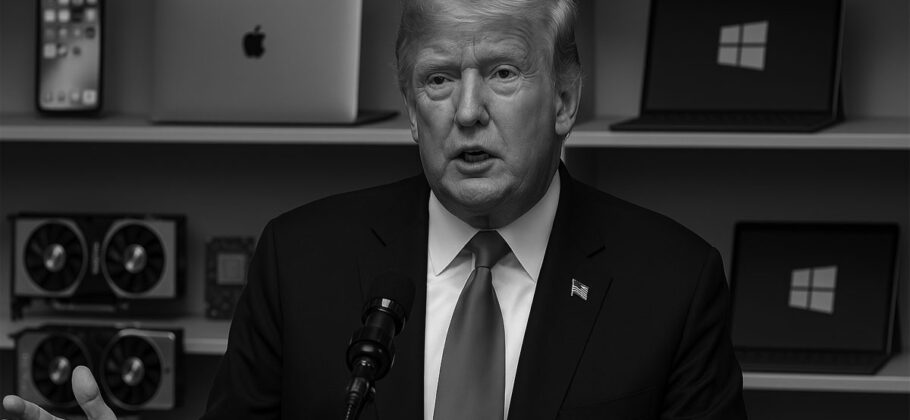President Donald Trump has officially exempted smartphones, personal computers, and several other high-demand electronics from his administration’s sweeping new reciprocal tariffs. The move is being seen as a major win for large American technology companies such as Apple, Nvidia, Microsoft, and others that rely heavily on global supply chains. With tariffs as high as 145 percent hitting most Chinese imports, the exemption shields some of America’s most valuable tech brands from severe disruption and cost increases.
Relief for Apple, Nvidia, Microsoft and Others
The updated tariff guidance from U.S. Customs and Border Protection excluded key product categories from the import taxes, including those defined under codes 8517.13.00 (smartphones) and 8471 (computers). The exemptions also cover semiconductors, hard drives, memory chips, and computer processors—all items that major U.S. tech firms either manufacture overseas or integrate into their products.
Apple stands to benefit the most. The company produces roughly 80 percent of its iPhones for the U.S. market in China. Had the tariffs gone forward without exemptions, Apple would have faced up to $50 billion in increased costs, according to CFRA Research analyst Angelo Zino. “The tariff impact, as it stands, would be particularly severe for Apple,” Zino explained in a note to clients. “We expect Apple to delay passing any tariff costs to consumers until its fall product cycle.”
Apple had already begun shipping 600 tons of iPhones—about 1.5 million units—from India to the United States in anticipation of trade complications. The exemption now gives the company breathing room while it continues to diversify its production footprint in India and Vietnam.
Nvidia, one of the world’s leading chipmakers, also benefits directly from the exclusion of semiconductors from the tariffs. Most of its high-end graphics chips are made outside the U.S., and any disruption in that pipeline could have had major consequences for both the company and its downstream partners in AI and gaming sectors.
Microsoft, which relies on an intricate network of global suppliers for its Surface devices and data center hardware, also avoids significant cost spikes. By sparing processors and memory modules, the administration is giving Microsoft time to relocate or reconfigure its supply chains.
“This is the dream scenario for tech investors,” said Dan Ives, global head of technology research at Wedbush Securities. “Smartphones, chips being excluded is a game-changer scenario when it comes to China tariffs.”
Why the Administration Made the Change
While the tariffs were originally pitched as part of a broader strategy to confront trade imbalances and bring jobs back to the U.S., the administration quickly recognized that hitting electronics would severely impact American consumers and companies.
President Trump addressed reporters aboard Air Force One, saying, “We’ll be very specific. But we’re taking in a lot of money. As a country, we’re taking in a lot of money.” Though he maintained that tariffs are still a tool to gain leverage, he acknowledged that the exemptions were necessary to stabilize critical industries.
White House Press Secretary Karoline Leavitt said the exclusions were part of a longer-term plan to shift electronics manufacturing to the United States. “President Trump has made it clear America cannot rely on China to manufacture critical technologies such as semiconductors, chips, smartphones, and laptops,” she stated. “At the direction of the President, these companies are hustling to onshore their manufacturing in the United States as soon as possible.”
The exemptions are retroactive to April 5 and apply not only to the global 10 percent tariffs but also to the 145 percent tariffs placed specifically on Chinese imports. China remains the only country excluded from a 90-day pause on new tariffs, while other nations will be shielded until July.
Strategic Advantage for American Tech
The decision to exempt electronics allows key U.S. firms to avoid immediate financial damage while keeping pressure on countries like China to make trade concessions. According to the U.S. International Trade Commission, China remains the largest exporter of electronic goods to the U.S., followed by Mexico, Taiwan, Vietnam, and Malaysia. Many American firms are already moving operations to these alternative hubs.
Trump’s tariff strategy continues to serve multiple purposes: penalizing nations that retaliate against U.S. trade policies, rewarding countries that cooperate, and encouraging American firms to re-shore production. The exemption does not affect the 20 percent tariff placed on Chinese goods connected to fentanyl trade activity, which remains in effect.
“This is about bringing jobs and factories back to America,” Trump said. “And I think something positive is going to come out of it.”
Critics Raise Concerns About Fairness
Despite the relief provided to major tech firms, critics have raised concerns about the broader implications. Some argue that giving exemptions to massive corporations like Apple and Nvidia undermines the broader goals of the tariff plan.
One critic posted online, “Apple got off easy because of its political ties. Small manufacturers don’t have the same pull.”
Apple CEO Tim Cook has maintained a notably close relationship with Trump since his first term, attending private dinners and donating $1 million to Trump’s inaugural committee. That relationship may have helped shape the administration’s decision to carve out electronics from the tariff list.
More details are expected in the coming days, but the exemptions offer a critical window for American tech giants to realign their operations and adapt to new global trade conditions. Trump indicated that the administration would continue to apply economic pressure where necessary but would also avoid inflicting unintended harm on vital U.S. sectors.
By sparing smartphones, semiconductors, and computing equipment from tariffs, the administration has shown a willingness to protect key U.S. firms from financial strain—even as it pursues one of the most aggressive trade agendas in modern history. For Apple, Nvidia, Microsoft, and others, this pause could be the lifeline they need to secure new production lines, avoid price shocks, and keep American technology competitive in a rapidly changing global economy.





